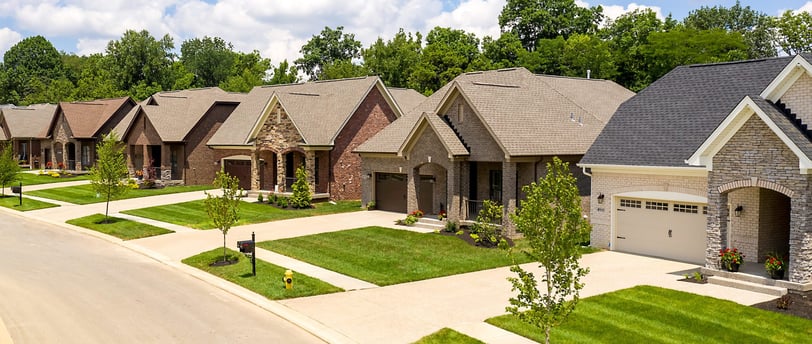Exploring New Construction Homes: Is It Right For You?
“Exploring New Construction Homes: Is It Right for You?” The benefits and considerations of buying a new construction home, tailored specifically for first-time buyers.
HOME BUYERS
Maria Melendez Realtor-Broker
8/18/20244 min read


Benefits of Buying a New Construction Home
Purchasing a new construction home offers numerous advantages, particularly for first-time buyers who are looking for modern amenities and long-term value. One of the primary appeals of new construction homes is the inclusion of contemporary features and energy-efficient technologies. New homes often come equipped with the latest appliances, smart home systems, and materials designed to minimize energy consumption. These eco-friendly features not only reduce utility bills but also contribute to a smaller environmental footprint.
Additionally, the prospect of customization is a significant draw for many homebuyers. New construction homes typically allow buyers to personalize various elements, ranging from floor plans to finishes. This level of customization ensures that homeowners can create a living space that truly reflects their tastes and needs, without the need for immediate remodeling or upgrades.
Another noteworthy benefit of new construction homes is the comprehensive warranty protection they offer. Most newly built homes come with warranties that cover structural defects, major systems, and appliances for a certain period. These warranties provide peace of mind and a financial safeguard against unforeseen repairs, making the ownership experience smoother and more predictable.
Being the first owner of a new construction home carries its own unique sense of satisfaction and security. Buyers can take comfort in knowing that every component of the house, from the roof to the plumbing, is brand new and built to current standards. This can translate to fewer maintenance issues and an overall decrease in the headaches often associated with older properties. Additionally, new homes are constructed in compliance with the latest building codes, ensuring better safety and construction quality.
In summary, the combination of advanced amenities, customization options, excellent warranty protection, and the assurance of being the first occupant makes new construction homes an attractive choice for many prospective buyers. These benefits not only enhance the quality of living but also offer significant financial and emotional rewards in the long term.
Financial Considerations and Incentives
When delving into the financial aspects of purchasing a new construction home, prospective buyers should be aware of several key factors. One primary consideration is the higher initial costs often associated with new construction homes, which stem from modern designs, updated amenities, and the premium usually placed on brand-new properties. However, these costs might bring future savings, with lower maintenance expenses being a significant advantage. New homes typically come with fewer immediate repair needs, reducing out-of-pocket expenses and providing peace of mind.
Financing options for new construction homes also merit close attention. Unlike existing homes, the buying process may include a construction loan and a standard mortgage. Construction loans cover the building phase and are converted into a long-term mortgage once the home is completed. These loans often have more stringent credit requirements and higher interest rates due to the increased risk to lenders, but they offer flexibility in the disbursement of funds as construction progresses. Additionally, many builders partner with preferred lenders, which can streamline the financing process and possibly provide better terms.
Builder incentives are another aspect worth exploring. To attract buyers, builders often offer enticing incentives such as free upgrades or assistance with closing costs. These incentives can significantly reduce the upfront financial burden and enhance the overall value of the purchase. Such offers can be particularly advantageous for first-time buyers, helping them afford a home with modern amenities without exceeding their budget.
Lastly, the investment potential of new construction homes in burgeoning areas should not be overlooked. New neighborhoods are often positioned in rapidly developing regions with promising growth prospects. Over time, this can lead to substantial appreciation in property values, making new construction homes not only a comfortable place to live but also a sound long-term investment.
Challenges and Drawbacks
Purchasing a new construction home comes with its own set of challenges and drawbacks that potential buyers must consider. One of the primary concerns is the timeline from the purchase agreement to moving in. Often, this process is much longer than buying an existing home. Buyers may face delays due to construction issues, weather conditions, or permit approval processes. These delays can be a source of significant emotional and financial stress, as they may lead to unexpected costs and longer wait times.
Another drawback is that many new construction homes come with generic designs. Unlike older homes that might boast unique architectural features and historical character, newly constructed homes often follow standard blueprints. This sameness can make new neighborhoods feel less personalized and may not meet the aesthetic preferences of all buyers.
Living in a developing neighborhood poses its own set of inconveniences. New construction areas often remain under development for several years. This can mean living amidst constant construction noise, dirt, and the ongoing arrival of heavy machinery, which can detract from the overall living experience. Additionally, common amenities such as parks, schools, and shopping centers might still be under development, affecting the lifestyle and convenience of future residents.
Location is another critical factor to consider. New construction homes are frequently built in suburban or less-central areas, away from the hustle and bustle of urban life. While this may appeal to some, it can be a drawback for those who prefer the convenience and vibrancy of city living. The distance from workplaces, entertainment, and essential services can lead to longer commutes and reduced access to city amenities.
Ultimately, those considering a new construction home must weigh these challenges against the benefits to determine if this type of property truly aligns with their needs and expectations.


